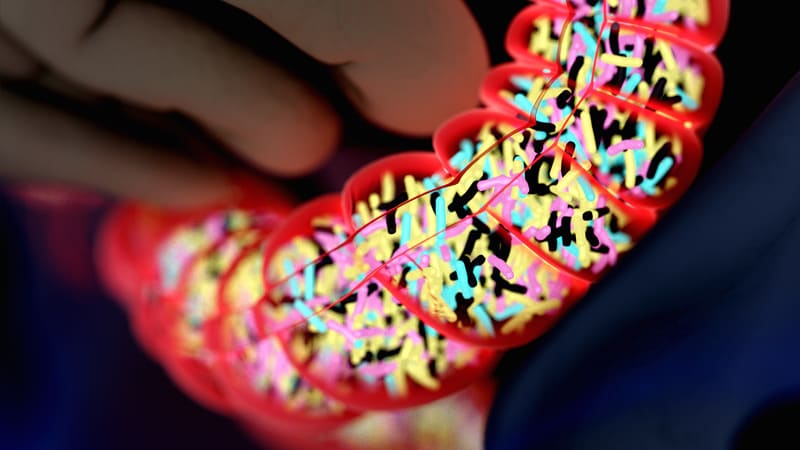Core Concepts
Gut bacteria composition may serve as a biomarker for preclinical Alzheimer's disease, potentially aiding in early detection and preventive treatments.
Abstract
The study explores the relationship between gut bacteria composition and preclinical Alzheimer's disease, suggesting a potential link for early detection and intervention. Key points include:
- Gut microbiome differences in preclinical Alzheimer's individuals
- Potential influence of gut microbiome on Alzheimer's disease
- Stool test as a screening tool for preclinical Alzheimer's
- Importance of further research to determine causality
- Cautionary notes on study limitations and population representation
Customize Summary
Rewrite with AI
Generate Citations
Translate Source
To Another Language
Generate MindMap
from source content
Visit Source
www.medscape.com
Altered Gut Bacteria a Biomarker of Preclinical Alzheimer's?
Stats
"The observed microbiome features correlated with amyloid and tau but not neurodegeneration biomarkers, suggesting that the gut microbial community changes early in the disease process."
"Including these microbiome features improved the accuracy, sensitivity, and specificity of machine learning classifiers for predicting preclinical AD status."
Quotes
"It could be that the changes in the gut microbiome are just a readout of pathological changes in the brain. The other alternative is that the gut microbiome is contributing to AD, in which case, altering the gut microbiome with probiotics or fecal transfers might help change the course of the disease." - Gautam Dantas
"One day, individuals may be able to provide a stool sample and find out if they are at increased risk for developing AD. It would be much easier and less invasive and more accessible for a large proportion of the population, especially underrepresented groups, compared to brain scans or spinal taps." - Beau Ances
Key Insights Distilled From
by Megan Brooks at www.medscape.com 06-16-2023
https://www.medscape.com/viewarticle/993345
Deeper Inquiries
How might the findings of this study impact the future of Alzheimer's disease diagnosis and treatment?
The findings of this study suggest that analyzing the gut microbiome could potentially serve as a biomarker for identifying individuals at a higher risk for developing Alzheimer's disease. This could revolutionize the early screening process for preclinical Alzheimer's by offering a simpler, less invasive, and more accessible method compared to traditional brain scans or spinal taps. If validated, individuals may one day be able to provide a stool sample to determine their risk for Alzheimer's, allowing for earlier interventions and personalized preventive treatments. Additionally, altering the gut microbiome through probiotics or fecal transfers might offer a novel approach to potentially changing the course of the disease.
What are the potential drawbacks or limitations of using gut microbiome as a biomarker for preclinical Alzheimer's?
While the use of gut microbiome as a biomarker for preclinical Alzheimer's shows promise, there are several potential drawbacks and limitations to consider. One limitation is the complexity of the gut-brain axis relationship, as it is not yet clear whether changes in the gut microbiome are a cause or a result of Alzheimer's disease progression. Additionally, the study population's lack of diversity, with the majority being White, raises concerns about the generalizability of the results to more diverse populations. Furthermore, factors beyond variations in the gut microbiome could potentially influence changes in brain markers of Alzheimer's, highlighting the need for further research to establish a causal relationship and address confounding variables.
How can the lack of diversity in the study population affect the generalizability of the results?
The lack of diversity in the study population, with the majority being White, can significantly impact the generalizability of the results to broader and more representative populations. Different ethnicities and races may have distinct gut microbiome compositions influenced by genetic, environmental, and lifestyle factors, which could affect the relationship between gut bacteria and Alzheimer's disease. Without a diverse study population, the findings may not accurately reflect the variability in gut microbiome profiles across different demographic groups. Therefore, it is crucial to replicate and confirm these findings in study groups that are more representative of the overall population to ensure the validity and applicability of using gut microbiome as a biomarker for preclinical Alzheimer's.
0
